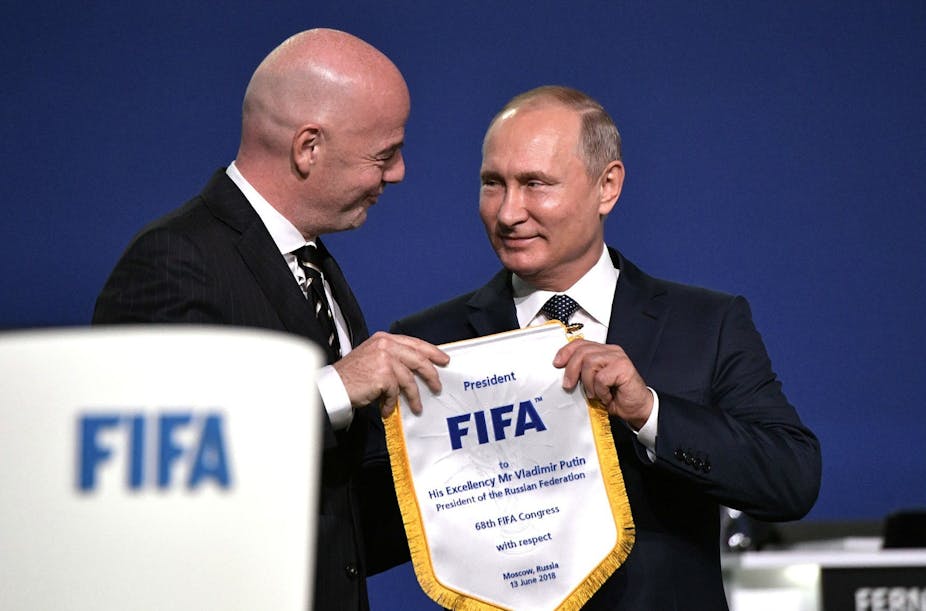Following the conclusion of the 2018 World Cup with France crowned champions, the tournament as a topic and Russia as the host nation are fading from view. Given the widespread misgivings prior to the tournament about the threat of orchestrated hooligan violence, ongoing conflicts in Ukraine and Syria, an appalling domestic rights record borne out by attacks against both political and LGBT activists, and accusations of conducting targeted murders in other countries, this might seem surprising.
The fact that these fairly major issues disappeared from the majority of news outlets during the four weeks of the World Cup demonstrates the power of such events to reset the news agenda. A telling example comes from Britain, where the government admitted that had England reached the finals it would have considered sending a delegation – despite tensions with the Russian government over the Skripal poisonings, among other things.
The coverage of Russia 2018 confirmed a pattern already observed in previous sports events: stories of controversy or lack of preparation fill time and space in the media before the event, but as soon as the competition begins, a “sphere of consensus” prevails.
The rise of ‘sportswashing’
This has happened before. In the run up to the 1978 World Cup in Argentina, the media reported that some national teams considered withdrawing from the tournament to protest the military dictatorship governing the host country. However, after the first match, the coverage focused mostly on what happened on the pitch. In other words, concerns, controversies and accusations are left aside and sports takes centre stage. With very few exceptions, nobody wants to be the party pooper.
Many have argued that major sporting events operate as a form of soft power, allowing host nations to promote themselves on a global stage. “Soft power” was a term coined by the US political scientist Joseph Nye, broadly defined as a way of reaching objectives through the power of attraction rather than military and economic force. Sources of soft power can be movies, music, world-renowned universities and, of course, sports.
Indeed, this concept has been applied to major sporting events, arguing that the Olympic Games or football World Cup represent ideal opportunities for countries to try and attract inward investment and promote their tourist industries. We’d argue for an alternative effect, that such events can actually close down, temporarily, critical views of a government. Such sporting mega-events operate as a means to launder a national government’s global image and reputation – even to the extent that adversarial countries will be prepared to engage with them. The effect is similar to greenwashing, whereby organisations use PR and marketing to claim their environmentally-friendly credentials in order to boost their reputations.
Politically avoiding the political
The supposedly apolitical character of sports events, as promoted by both FIFA and the International Olympic Committee, makes them particularly attractive for states in which there is little or no free political debate. The opportunity to harness these events is improved by the fact that, at least in more democratic societies, protests surrounding sporting mega events have grown over time, and cities and countries are increasingly reluctant to take part in the bidding processes for these competitions.
Soon enough, the eyes of the world will turn to Qatar and the 2022 World Cup. The host country has already promised to surpass the event in Russia and, in order to boost global prestige, it will attempt to use the World Cup to bring attention to its political stability, military collaboration with the US, redistribution and aid policies, and the prestige of its Al Jazeera news channel, among other aims. But there are growing concerns about the first World Cup to be played in the Middle East, including the deaths of construction workers building new stadiums, human rights records, high temperatures, and a lack of existing football culture in the host country. And yet these issues will very likely be out of the spotlight just as soon as the first match kicks off.
Should we be concerned about the ability of some pretty odious regimes to rinse their reputations through their involvement in sporting events that generate pleasure for so many worldwide?
The prevailing – and somewhat naïve - attitude of most participants and fans is that sports are politically neutral. Once they start, so the view goes, global competitions like the Olympic Games or the World Cup should not be tarnished by these sorts of political considerations. By taking this line are we as sports fans not also complicit in this sportswashing? And if so, what can players, observers and the media do to ensure that sporting tournaments aren’t used to absolve states of their responsibilities to their own people and to the wider international order?
Let’s hope that in the four years before the beginning of the Qatar 2022 World Cup and the four weeks of the competition’s duration, these questions are in the forefront of our minds, so that future sporting mega events will be not only enjoyable, but more ethically, morally and politically responsible.

